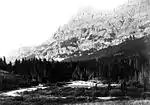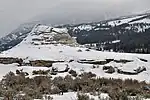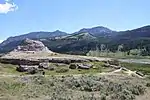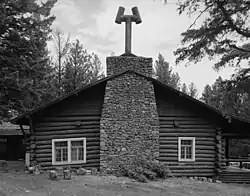| Soda Butte Creek | |
|---|---|
 Soda Butte Creek | |
| Location | |
| Country | United States |
| State | Wyoming |
| Physical characteristics | |
| Source | |
| • location | 45°01′20″N 109°55′03″W / 45.02222°N 109.91750°W,[1] Yellowstone National Park, Montana |
| Mouth | Lamar River |
• location | 44°52′12″N 110°11′43″W / 44.87000°N 110.19528°W[1] Yellowstone National Park, Wyoming |
• elevation | 6,601 ft (2,012 m) |
| Discharge | |
| • location | Lamar Ranger Station |
| • average | 143 cu ft/s (4.0 m3/s)[2] |
Soda Butte Creek is an approximately 20 miles (32 km) long major tributary of the Lamar River in Yellowstone National Park. It is named for a now-extinct geyser (Soda Butte) near its mouth. Soda Butte and the creek were named by A. Bart Henderson, a Cooke City miner, in 1870.[3] It rises just outside the northeast corner of the park on the southern slopes of the Absaroka Range near Cooke City, Montana. The Northeast East Entrance road parallels Soda Butte Creek for its entire length within the park. Soda Butte Creek is a popular angling destination for native Yellowstone cutthroat trout.
Angling
Soda Butte Creek is a popular angling destination for fly fisherman. It holds brook trout in it upper reaches, mostly cutthroat trout and a few rainbow trout in its lower section. Because of spring runoff, the creek is generally not fishable until mid-July.[4][5] The National Park Service has made frequent changes to the regulations for the Lamar drainage, including Soda Butte, and in 2018 has made significant new changes. Anglers are now required to kill all non-native fish, including rainbow trout, brook trout, and identifiable rainbow/cutthroat hybrids throughout the Lamar drainage, including all of Soda Butte. On page 14 of the 2018 regulations they still say that if it has a red slash put it back, but that is clearly superseded by the region specific requirement that if a fish landed in the Lamar drainage is clearly identifiable as a hybrid then it must be killed, even if it has a red slash, with the caveat that "if you don't know, let it go." Another significant change to the Park-wide fishing regulations is that felt soles are no longer permitted on waders. Other Park-wide regulations, that continue from previous years, are that barbed hooks, lead weights, lead split shot, and live bait are banned.[6]
Wolves
A wolf pack re-introduced in 1995 was called the Soda Butte Pack. It was later renamed the Yellowstone Delta Pack in 2000 after all the originals members of the pack died.[7]
 Soda Butte, ca 1872 William Henry Jackson
Soda Butte, ca 1872 William Henry Jackson Soda Butte Creek, circa 1890
Soda Butte Creek, circa 1890 Soda Creek, January 2009
Soda Creek, January 2009 Soda Butte, December 2009
Soda Butte, December 2009 Soda Butte, June 2016
Soda Butte, June 2016
See also
Notes
- 1 2 U.S. Geological Survey Geographic Names Information System: Soda Butte Creek
- ↑ "USGS Surface Water data for Montana: USGS Surface-Water Annual Statistics".
- ↑ Haines, Aubrey L. (1996). Yellowstone Place Names-Mirrors of History. Niwot, Colorado: University of Colorado Press. p. 57. ISBN 0-87081-383-8.
- ↑ Parks, Richard (1998). Fishing Yellowstone National Park. Helena, MT: Falcon Press. ISBN 1-56044-625-0.
- ↑ Mathews, Craig; Molinero, Clayton (1997). The Yellowstone Fly-Fishing Guide—An authoritative guide to the waters of Yellowstone National Park. Guilford, CT: The Lyons Press. ISBN 1-55821-545-X.
- ↑ "2013 Yellowstone National Park Fishing Regulations". National Park Service. Retrieved 2013-05-20.
- ↑ "Yellowstone Wolf Project, Annual Report 2000" (PDF). Retrieved 2021-09-04.
